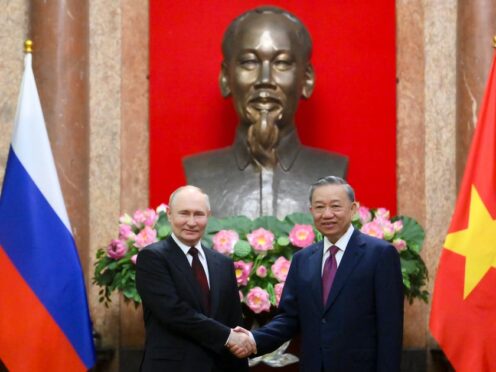Russian president Vladimir Putin has signed a series of deals with his Vietnamese counterpart To Lam during a state visit that comes as Moscow is seeking to bolster ties in Asia to offset growing international isolation over its military actions in Ukraine.
The two signed agreements to further co-operation on education, science and technology, oil and gas exploration and health.
They also agreed to work on a road-map for a nuclear science and technology centre in Vietnam.
Following the talks, Mr Putin said that the two countries share an interest in “developing a reliable security architecture” in the Asia-Pacific Region based on not using force and peacefully settling disputes with no room for “closed military-political blocs”.
Mr Putin had arrived at Vietnam’s Presidential Palace on Thursday afternoon, where he was greeted by school children waving Russian and Vietnamese flags.

There he shook hands with and embraced Vietnam’s new president To Lam before a bilateral meeting and a joint briefing to the media.
Mr Putin had arrived in Hanoi early on Thursday morning from North Korea, where he and North Korean leader Kim Jong Un signed an agreement that pledges mutual aid in the event of war.
The strategic pact that could mark the strongest connection between Moscow and Pyongyang since the end of the Cold War comes as both face escalating stand-offs with the West.
He met prime minister Pham Minh Chinh later in the afternoon and is also scheduled to meet Communist Party general secretary Nguyen Phu Trong — Vietnam’s most powerful politician — and parliamentary chief Tran Thanh Man.
Russia is keen to maintain “close and effective co-operation” in energy, industry, technology, education, security and trade, said Russian ambassador to Vietnam Gennady S Bezdetko on Wednesday, according to Vietnamese official media.
The trip has resulted in a sharp rebuke from the US embassy in the country.
Much has changed since Mr Putin’s last visit to Vietnam in 2017. Russia now faces a raft of US-led sanctions for its invasion of Ukraine.
In 2023, the International Criminal Court in Hague issued an arrest warrant for Mr Putin for war crimes. The Kremlin rejected it as “null and void,” stressing that Moscow does not recognise the court’s jurisdiction.
Mr Putin’s recent visits to China and now North Korea and Vietnam are attempts to “break the international isolation,” said Nguyen Khac Giang, an analyst at Singapore’s ISEAS-Yusof Ishak Institute.
The US and its allies have expressed growing concerns over a possible arms arrangement in which Pyongyang provides Moscow with badly needed munitions for its use in Ukraine, in exchange for economic assistance and technology transfers that could enhance the threat posed by Mr Kim’s nuclear weapons and missile programme.

Both countries deny accusations of weapons transfers, which would violate multiple UN Security Council sanctions that Russia previously endorsed.
Meanwhile, Russia is important to Vietnam for two reasons, Mr Giang said: It is the biggest supplier of military equipment to the Southeast Asian nation, and Russian oil exploration technologies help maintain its sovereignty claims in the contested South China Sea.
“Russia is signalling that it is not isolated in Asia despite the Ukraine war, and Vietnam is reinforcing a key traditional relationship even as it also diversifies ties with newer partners,” said Prashanth Parameswaran, a fellow with the Wilson Center’s Asia Programme.
Hanoi and Moscow have had diplomatic relations since 1950, and this year marks 30 years of a treaty establishing “friendly relations” between Vietnam and Russia.
Evidence of this long relationship and its influence can be seen in Vietnamese cities like the capital, where the many Soviet-style apartment blocks are now dwarfed by skyscrapers and a statue of Vladimir Lenin, the founder of the Soviet Union, stands in a park where children skateboard every evening.
Many of the Communist Party’s top leadership in Vietnam studied in Soviet universities, including party chief Mr Trong.
In an article written for Nhan Dan, the official newspaper of Vietnam’s Communist Party, Putin vowed to deepen the ties between Moscow and Hanoi and hailed Vietnam as a “strong supporter of a fair world order based on international law, on the principles of equality of all states and non-interference in their domestic affairs”.
He also thanked “Vietnamese friends for their balanced position on the Ukrainian crisis,” in the article released by the Kremlin.
A manufacturing powerhouse and an increasingly important player in global supply chains, Vietnam played host to both US president Joe Biden and the leader of rival China, Xi Jinping, in 2023.
Vietnam has remained neutral on Russia’s invasion of Ukraine. But neutrality is getting trickier, with the US embassy in Hanoi criticising Mr Putin’s visit, saying that “no country should give Putin a platform to promote his war of aggression and otherwise allow him to normalise his atrocities”.
If Mr Putin is allowed to travel freely it “could normalise Russia’s blatant violations of international law,” the statement said.
